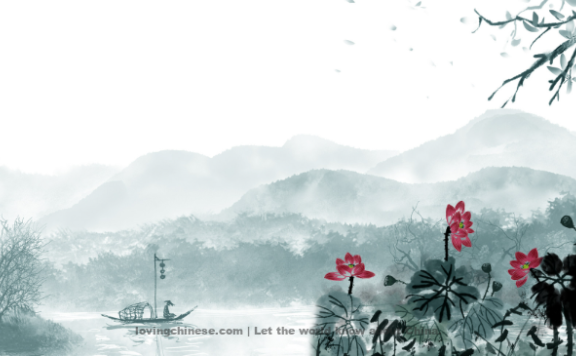-
Wang Qi Poem: Watching the Southern Shore – 王琪《望江南·江南月》
Wang Qi's lyric on the moon draws on the scenery to express his feelings, and speaks of his emotions: the roundness of the moon symbolizes the unpredictability of human affairs;- 12
- 0
-
Wang Qi: Visting a Small Garden in Late Spring ~ 《春暮游小园》 王淇 with English Translations
《春暮游小园》这首诗为七言绝句,用花开花落,表示时序推移,虽然一年的春事将阑,但不断有新的事物出现,大自然是不会寂寞的。全诗写得很有情趣,前两句,写一春花事,以女子搽粉抹胭脂作比,非常活泼,充满人间趣味。这也是写景诗和咏物诗最常用的一种手法,但又没有流于一般化。这是诗人的高明之处。 《春暮游小园》 王淇 一从梅粉褪残妆,涂抹新红上海棠。 开到荼蘼花事了,丝丝天棘出莓墙。 Visting a Small Garden in Late Spring Wang Qi Since the mume blossom takes off her rosy attire, The crabapple has rouged her face as red as fire. When rasphery fades, comes the end of flowers all; Only the trailing plants appear over the mossy wall. -
Wang Qi Poem: Mume Blossoms – 王淇《梅》
梅[1] 王淇 不受尘埃半点侵[2], 竹篱茅舍自甘心[3]。 只因识适林和靖[4], 惹得诗人说到今。 注释: [1] 《千家诗》注说:“林和靖隐于孤山之梅岭上,放鹤湖中,不婚不宦,萧然自适,人称其以梅为妻,以鹤为子。王淇此诗,盖咏梅之为物,清莹皎洁,不受尘埃半点之侵;从不生于雕阑画栋之下,而甘心于竹篱茅舍之间。予谓梅本自清闲幽雅,何意误嫁林和靖,惹诗人谈笑至今以为佳话乎!”这首诗幽默地赞美了梅花和诗人的清高幽雅。 [2] 侵:侵染。 [3] 甘心:心甘情愿。 [4] 林和靖:北宋诗人林逋,喜爱梅花,多有咏梅佳句。 Mume Blossoms Wang Qi No dust has left the least stain on the pure mume flower, She is content with bamboo fence and thatched bower. But married by mistake to the poet of crane, She is glorified in verse again and again. -
Wang Qi Poem: Visiting a Small Garden in Late Spring – 王淇《春暮游小园》
春暮游小园 王淇[1] 一从[2]梅粉褪残妆[3], 涂抹新红上海棠[4]。 开到荼䕷[5]花事了[6], 丝丝天棘[7]出莓墙[8]。 注释: [1] 王淇:字菉漪,宋代诗人。《千家诗》注说:“此言春事将阑也。梅花零落,则粉褪残妆矣。而新红艳丽又发于海棠枝上。及夫荼䕷开后,一春之花事已终,惟有丝丝之天棘,蔓生而出于莓墙之上而已。”这首诗用四种花木写暮春自然界的变化,花开花谢都是自然规律,人不必伤感。即使红梅、海棠、荼䕷都开过了,还有生机勃勃的天棘和青苔呢。 [2] 一从:自从。 [3] 褪残妆:指花朵凋谢。 [4] 涂抹新红上海棠:梅花鲜艳的红色涂抹到海棠花上,即指梅花凋谢之后海棠接着绽放。 [5] 荼䕷:一种花,春末夏初开放。 [6] 花事了:开花的场面即将结束,即春天将要过去。 [7] 天棘:一种有刺的荆蔓,俗称酸枣树。 [8] 莓墙:长满苔草的墙。 Visiting a Small Garden in Late Spring Wang Qi Since the mume blossom takes off her rosy attire, The crabapple has rouged her face as red as fire. When raspberry fades, comes the end of flowers all; Only the trailing plants appear over the mossy wall. 《春暮游小园》是南宋诗人王淇创作的一首七言绝句。此诗写梅花、海棠、荼蘼开落的先后次序,以至于到百花凋残,天棘出墙来表现从暮春到初夏的更替,暗含诗人留连岁月、感叹年华易逝的感伤情绪。这首诗用平易浅近的语言、拟人化的手法细腻地表现出平淡无奇的生活景观富有美感诗意。 The poem "Visiting a Small Garden in Late Spring" is a seven-line poem written by the Southern Song poet Wang Qi. The poem describes the order in which the plum blossoms, begonias and confederates bloom and fall, until the flowers wither and the thorns emerge from the walls to show the change from late spring to early summer, implying the poet's sentiment of lingering on the years and lamenting the ease of passing. The poem uses simple and simple language and anthropomorphic techniques to delicately express the beauty and poetry of the ordinary and unspectacular landscape of life.
Checking in, please wait...
Click for today's check-in bonus!
You have earned {{mission.data.mission.credit}} points today
My Coupons
-
¥CouponsLimitation of use:Expired and UnavailableLimitation of use:
before
Limitation of use:Permanently validCoupon ID:×Available for the following products: Available for the following products categories: Unrestricted use:Available for all products and product types
No coupons available!
Unverify
Daily tasks completed
















